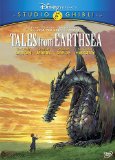| Reviews & Columns |
|
Reviews DVD TV on DVD Blu-ray 4K UHD International DVDs In Theaters Reviews by Studio Video Games Features Collector Series DVDs Easter Egg Database Interviews DVD Talk Radio Feature Articles Columns Anime Talk DVD Savant Horror DVDs The M.O.D. Squad Art House HD Talk Silent DVD
|
DVD Talk Forum |
|
|
| Resources |
|
DVD Price Search Customer Service #'s RCE Info Links |
|
Columns
|
|
|
Tales From Earthsea

Tales from Earthsea is a Studio Ghibli production originally released to Japanese cinemas in 2006. Due to rights issues the film has only recently made a North American debut to eager audiences who were patient enough to wait for a proper release of this highly anticipated adaptation. The film is directly inspired by the series of novels written by Ursula K. Le Guin. This adaptation of the story is far from being a meticulously faithful rendition though, and fans of the book series should consider that aspect when experiencing the film for the first time. Those unfamiliar with the books may actually have a much more rich and rewarding experience overall. This is an incredible breath of fresh air for dedicated anime fans and anyone who simply appreciates the beauty of the artistry on display.
Hayao Miyazaki (Spirited Away, Princess Mononoke) wanted to make Tales from Earthsea into a feature length film for an incredibly long time (it was one of the earliest projects he ever desired to be involved in) and yet this may the one project he desired to make that seemed to escape from his grasp. When he originally tried to receive the rights to create an adaptation he wasn't able to secure them from Usula K. Le Guin (at that point in time she hadn't seen any of his movies and surely didn't know better). Hayao Miyazaki never did get to make that story. His son, Goro Miyazaki, was the one to helm it. Goro aimed to bring to life the story that his dad had always wanted to tell and to make this his feature filmmaking debut.
The story takes place in a mystical land with a kingdom that seems to spread across a vast and glorious world. There are also several locations (such as towns) briefly highlighted and moved away from plot-wise as the characters journey in the somewhat sprawling epic story. The Kingdom, introduced at the beginning, has now become dominated by unrest with the dragons now navigating the kingdom sky. Dragons and humans used to be together as one in harmony, but over time the dragons and humans separated. The belief was held that the dragons would not be seen again in the human world. Now that the dragons have returned it is the signal of a dangerous new time that threatens a balance for the entire world. Arren, a young teenage boy, is found by a gentle wizard named Ged as he crosses the lands. This unlikely pair teams up. They journey together during these confused and dangerous times. Arren has a dark past that continues to haunt him. Ged, on the other hand, has some of his own business to attend to along the way. Theru, another important character in the film, is a young teenage girl who Arren and Ged encounter and eventually help. Arren meets her for the first time as she is being attacked by slavers, and he protects her while also demonstrating his inner darkness in an essential scene. Theru is afraid of this darkness and flees. Alas, Theru would encounter Arren again, along with Ged, when they run across each other again later in the story. These characters roles and destinies appear to be intertwined. Yet darkness looms as a villain character has plans that could affect the balance of the kingdom, world, and indeed these characters.
The storyline isn't perfect. In fact, it could be perceived as confusing at times for audiences. It's a story that focuses more on the journey taken by the characters than on the ultimate destination. Yet it doesn't brush off the details and the script actually seems determined to craft compelling plot-points for the characters to become immersed within. It does succeed in that area of storytelling. Frankly, the overall effect is enjoyable and filled with far more positives than detractors.
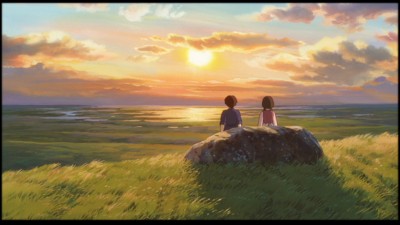
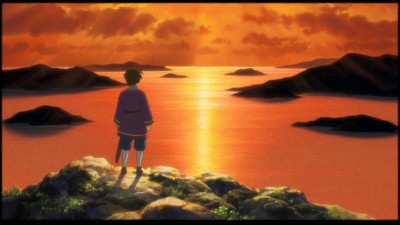
Music plays an important role in the film. This aspect can be readily identified through the earthy and action-ready score by Tamiya Terashima. The score always seems capable of addressing the needs of individual scenes. The overall effect is strikingly powerful and memorable. Some truly beautiful songs are also used to help enhance the themes (as emphasized mainly in the Japanese dub version).
The animation is simply breathtaking to behold. This is a visually sumptuous delight from start to finish and that is one aspect worthy of strong emphasis. It is actually difficult to imagine the film failing to make a lasting impression through the art of the undeniably convincing landscapes, distinctive character designs, and other impressively animated moments. It is clear that some of the best animators in the entire animation industry (across the globe) are involved in creating Studio Ghibli productions. Tales from Earthsea is no exception to that expectation. Serious Hayao Miyazaki fans will still probably notice that certain scenes lack the same level of detail as found in other productions by the studio. All things considered though -- this is still a lavish production.
Regarding the film's PG-13 MPAA rating -- this is only the second film from Studio Ghibli to receive that rating (the other film is Hayao Miyazaki's Princess Mononoke). The violence in the film is more prominent within certain scenes in comparison to the usual productions of the studio and yet this still manages to remain distanced from the disturbing imagery that Princess Mononoke frequently provoked. This may actually require some kind of screening for young children (for parents to test the appropriateness of the material themselves) but given the maturity of the youth in question this might be seen as more appropriate fare to show some children - more so than the rating indicates. This point feels worthy of being made given the intense fandom of Studio Ghibli productions amongst younger audiences.
Tales from Earthsea was made by the son of a filmmaking genius. Goro Miyazaki aimed to follow in his father's footsteps. It's easy to see how this film may not manage to live up to expectations set across the board. Expectations were naturally going to be high given the factors involved in making this film. However, it would be a formidable task for any film to be compared to something of Hayao Miyazaki's caliber. I have no doubt comparisons will continue to be drawn on future films by Goro Miyazaki. A clear distinction between these two filmmakers should be made nonetheless. There are certainly some notable similarities between the two filmmakers (such as attention to detail, a deep respect for nature, and careful attention to character) but there are also aspects that differentiate the two (such as a different level of emphasis on action and a unique stylistic approach to some character development). This film is the byproduct of someone who yearns for their own storytelling sensibilities and it is actually rather exciting to see this strong of a debut film from a promising new talent. Goro Miyazaki has proven himself to be exactly that through his demonstration of immense craftsmanship with the genuinely worthwhile Tales from Earthsea.
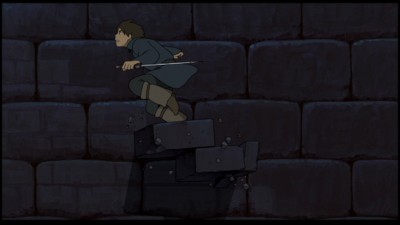
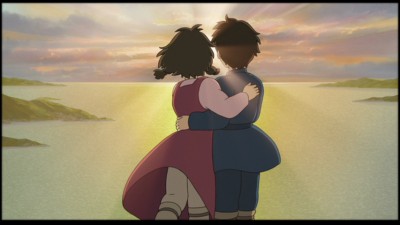
The DVD:
Video:
Tales from Earthsea may not have a Blu-ray release available as of this writing (the film is not available on the High Definition format in Japan yet either). The good news is that this DVD release from Disney presents the film in its original theatrical aspect ratio of 1:85:1 and the results are absolutely pleasing for the eyes with a visually spectacular anamorphic widescreen transfer. The colors are bold, crisp, and an absolute joy with proper saturation and immersive depth. This is also a very clean looking image throughout. The bottom line should be that this release is sure to impress for its visual merit.
Audio:
The 5.1 Dolby Digital Surround Sound mix included for the original Japanese language dub is astounding and a true joy to experience on this release. The music by Tamiya Terashima is beautifully reproduced; the bass is strong, with directionality and effects tightly woven. It is a highly effective mix and should be quite pleasing for fans of the film. Sadly, the English language dub featured on this release doesn't manage to come close to sounding as good. It's encoded at a lower bitrate and only available with 2.0 audio. The voice actors on the English version include Timothy Dalton, Cheech Marin, Willem Dafoe, and Mariska Hargitay. While that is an impressive ensemble, I would recommend simply viewing the film in the original language with English subtitles (as included optionally) as it is a more enjoyable experience in terms of dynamics. The Japanese voice acting is also uniformly impressive, and so are the songs (which are preserved in Japanese on the English dub version; though the English track doesn't bother to include the meaningful subtitles that display the lyrics).
Extras:
Disney could have done far better. They have in the past. Unfortunately, many Studio Ghibli releases tend to be shortchanged a bit when it comes to supplemental features. Tales from Earthsea is no exception to this trend. The only "substantial" extra is a rather short (approx. 5 min) Behind the Studio featurette which interviews the film's producer Toshio Suzuki, who gives some quick background information on the film and how it came to exist. This was an informative and engaging piece but it's also over in a flash. I would have appreciated more substantial extras regarding the film's creation.
Also included is the standard Enter the Lands interactive map. This extra has been included on several Studio Ghibli releases made available by Disney. It allows for viewers to click on images from various Ghibli films and receive some brief information on the films with voice over narration and clickable clips from the films. I cannot fathom how this could possibly be worth investigating for adults. It's likely intended to be used by children, who can then tell their parents about the Ghibli films they haven't seen so that the adults can go out and buy the rest for the kids.
Lastly, the DVD includes a Studio Ghibli Trivia Challenge found within the interactive map. This is a sort-of enjoyable extra for trivia fans but it will only entertain for a few minutes.
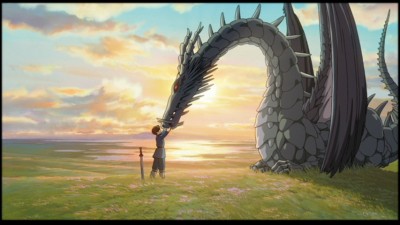
Final Thoughts:
Neil Lumbard is a lifelong fan of cinema. He aspires to make movies and has written two screenplays on spec. He loves writing, and currently does in Texas.
|
| Popular Reviews |
| Sponsored Links |
|
|
| Sponsored Links |
|
|
| Release List | Reviews | Shop | Newsletter | Forum | DVD Giveaways | Blu-Ray | Advertise |
|
Copyright 2024 DVDTalk.com All Rights Reserved. Legal Info, Privacy Policy, Terms of Use,
Manage Preferences,
Your Privacy Choices | |||||||









